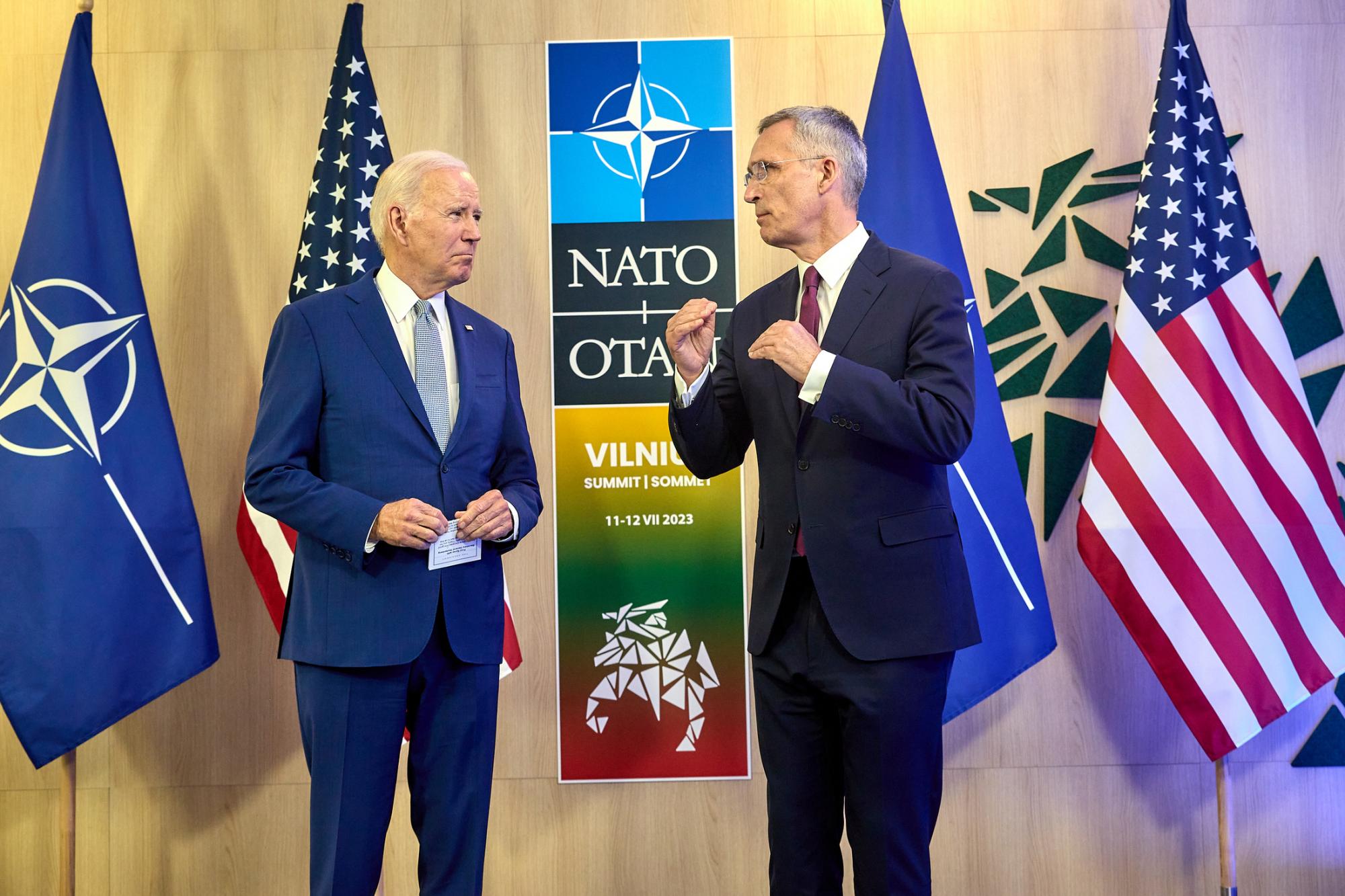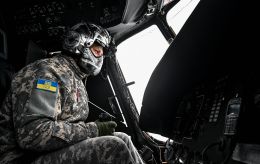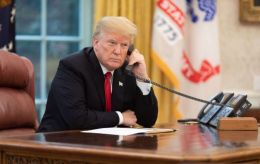Fear within the Alliance: Why the West hesitated to invite Ukraine to NATO
 Joe Biden and Olaf Scholz (Photo: twitter.com/Bundeskanzler)
Joe Biden and Olaf Scholz (Photo: twitter.com/Bundeskanzler)
As Ukraine awaited a decision on its invitation to join NATO, several countries stood in opposition, raising concerns about potential escalation. How did Ukrainian allies make efforts to persuade these nations and what reception did President Volodymyr Zelenskyy face in the Lithuanian capital? A comprehensive report from the first day of the NATO summit in Vilnius.
Events like NATO summits, typically, do not carry significant intrigue. Their decisions are discussed and approved in advance, becoming public prior to the summit.
However, there is one high-level event that witnessed a considerable amount of uncertainty. Interestingly, it also took place in Vilnius, with Ukraine at the center of the intrigue. Ten years ago, the European Union's summit in Vilnius involved a critical decision regarding the Association Agreement with Ukraine. The summit ended in failure and became an utter embarrassment for the Ukrainian leadership at the time, with far-reaching consequences.
Unlike that summit, this year's NATO summit cannot be labeled as a failure. If anyone is to be blamed this time, it would be the Western countries rather than Ukraine. Ukraine will leave Vilnius with a package of diverse achievements. However, unfortunately, all these accomplishments are unlikely to outweigh the main disappointment - NATO countries did not dare to extend an invitation to Ukraine to join the Alliance or at least outline specific parameters for such an invitation.
The question of Ukraine's invitation to the Alliance remained the primary intrigue, even after unexpectedly lifting barriers to Sweden's NATO accession on the eve of the summit. Closed-door discussions on Ukraine's invitation continued throughout the day, eventually involving heads of state and governments.
Although Ukraine did not participate directly, it relied heavily on several allies: France, the United Kingdom, Poland, and the Baltic countries. Two countries opposed extending the invitation to Ukraine: the United States and Germany. It remains uncertain which position was more problematic - Washington's or Berlin's. Many Western media dub the American President, Joe Biden, as the main "Ukraine skeptic," while sources talking to RBC-Ukraine point primarily to Olaf Scholz.

Olaf Scholz (Photo: Vitalii Nosach/RBC-Ukraine)
On the first day of the summit, no official comments were received on the matter. Such events restrict journalist access to top officials and are known for their limited and tightly regulated communication, often avoiding direct answers. Some leaders even refuse to speak on certain topics altogether, as was the case with German Foreign Minister Annalena Baerbock when asked directly about Ukraine's invitation to the Alliance, according to RBC-Ukraine.
A well-informed source told RBC-Ukraine that two days prior to the summit, Germany, together with the United States, proposed amendments to the draft communiqué. Germany aimed to completely remove the word "invitation" from the document.
In response, Ukraine, along with its allies, began to raise the stakes. The unexpected statement by Lithuanian President Gitanas Nauseda on the eve of the summit, suggesting a potential veto on the communiqué if it didn't align with his country's national interests, was the first move. On Tuesday afternoon, Ukrainian President Volodymyr Zelenskyy made a sharp statement, calling NATO's indecisiveness regarding Ukraine's invitation "unprecedented" and "absurd."
An hour after Zelenskyy's statement, the final stage of communiqué negotiations commenced. At that point, the Germans (alongside the Americans) managed to convince others that omitting any mention of Ukraine's invitation would be impossible. However, Germany simultaneously attempted to insert numerous caveats into the formulation of the invitation, effectively devaluing it.
Throughout the discussions of recent weeks, days, and hours, Ukraine's allies aimed to ensure that the communiqué would unequivocally establish Ukraine's invitation to NATO as the sole possible path for future developments. Once committed to this path, the Alliance would be unable to deviate. The logic behind Germany's position was parallel: if Ukraine's invitation to NATO becomes inevitable, it would be an immediate "escalation" and, in essence, a direct path to a third world war.
Berlin (and likely Washington) still considers the potential inclusion of Ukraine in NATO as a bargaining chip in hypothetical peace negotiations with Russia in the future.
Of course, no one publicly admits this. Without concrete arguments that can be presented to the public, Americans, for example, resort to semantic substitutions. For instance, during a late Tuesday evening briefing, the Spokesperson for the U.S. Department of State, Matthew Miller, pondered why Ukraine couldn't be admitted to NATO right now, even though the question of Ukraine's accession to the Alliance is not currently on the table, despite Ukraine's most vocal insistence.
While the invitation (and the promise to extend such an invitation) imposes no specific obligations on NATO member countries regarding countering Russia, it has no relevance to Article 5 of the North Atlantic Treaty on collective defense.
 Joe Biden and Jens Stoltenberg (Photo: nato.int)
Joe Biden and Jens Stoltenberg (Photo: nato.int)
As a result of the summit, the final official wording of the communiqué, stating that an invitation to Ukraine could be extended "when allies agree and conditions are met," perfectly aligns with Germany's desired outcome. The inclusion of both "allies' agreement" and "conditions" introduces a deliberate ambiguity in the formulation. The specific "conditions" to be fulfilled will entirely depend on the political will of the Alliance, and these conditions are likely to dynamically evolve in response to the situation.
During the press conference at the end of the day, NATO Secretary-General Jens Stoltenberg failed to provide any specific details regarding these conditions. Nevertheless, he attempted to convey a sense of utmost optimism by emphasizing other decisions made by the allies, such as the creation of the Ukraine-NATO Council and the launch of a multi-year assistance program for Ukraine. Most importantly, he underscored the elimination of the Membership Action Plan (MAP) as a mandatory step toward Ukraine's membership in the Alliance. In this regard, significant progress has indeed been made compared to the Bucharest Summit. However, other reasons for optimism are not yet evident.
***
While awaiting the final text of the communiqué at the summit, Lithuanians and Ukrainians gathered in the city center at Lukiškės Square. Streams of people, carrying Ukrainian, and Lithuanian flags, and NATO's emblem, converged toward the large stage bearing the massive inscription "UKRAINENATO33."
Local Ukrainians who had traveled to Lithuania eagerly anticipated the arrival of President Zelenskyy, who was scheduled to deliver a speech and raise the battle flag brought from Bakhmut above Vilnius. Fifteen minutes before the ceremony began, navigating through the crowd became practically impossible as thousands of people, the majority being Lithuanians, assembled on the square.
RBC-Ukraine approached elderly women sitting on a bench along the perimeter of the square, waving Lithuanian and Ukrainian flags. One of them, named Laima, admitted she didn't know English but was fluent in Russian.
"Why are you here?" asked RBC-Ukraine.
"Because we love you. We support you and stand by you," Laima replied.
Her friend, Dana, vigorously nodded and smiled.
"I've been to Truskavets several times, an astonishing place. Ukrainians are wonderful people. I saw the elderly women selling fruits there. I paid them, but I didn't take any fruits," Dana recounted.
A short distance away, there was a young man sitting on the bench. He introduced himself as Andrius and spoke English fluently, readily agreeing to provide a comment. When asked why he was there, he laughed and said the answer was obvious - he was waiting for Zelenskyy.
"It's interesting to see what he will say about NATO. He must navigate between not appearing pushy but also exerting pressure. We understand that very well, and we truly want Ukraine to be in NATO, the sooner, the better. We strongly support that," he expressed.
Andrius shared that he felt trapped in the Russian-Ukrainian war, primarily because Russia is nearby, and the Kremlin often mentions "the Baltic States" while claiming their rights.
"They constantly try to realize their imperialistic ambitions. It used to surprise me, but not anymore. I think there are very few normal people there, and they are probably genuinely suffering, but they are part of a terrorist country. It's terrible for them, but I don't care about the rest," Andrius concluded.
 Volodymyr Zelenskyy in the center of Vilnius (Photo: GettyImages)
Volodymyr Zelenskyy in the center of Vilnius (Photo: GettyImages)
A loud round of applause erupts even before Zelenskyy takes the stage. Stepping out of the car, he heads backstage, where Lithuanian President Nauseda awaits him, eagerly extending his arms for a hug. Together, they walk onto the stage, and the ovation grows even louder. Before the speech begins, the Ukrainian national anthem resonates through the chapel. Not knowing the words, the Lithuanians hum along with the melody, while a woman of advanced age rises slowly from her seat in the crowd, pressing her hand to her chest.
Addressing the audience, the President of Ukraine expresses gratitude to the Lithuanians multiple times, and Nauseda remarks that he is helping in "practically everything."
"Today, I came here with faith in the decisions, faith in our partners, faith in a strong NATO. In a NATO that doesn't hesitate, doesn't waste time, and doesn't turn a blind eye to any aggressor."
Clearly, similar messages, perhaps more specific and in different formulations, Zelenskyy will be able to deliver personally to Western leaders on the second day of the summit. Today, the Ukrainian delegation will already participate directly in the events. However, it will be impossible to reverse the decision made on Tuesday regarding Ukraine's invitation to the Alliance.

